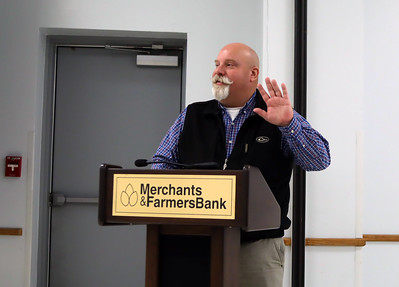Feral hogs, electronic grading, H2A on the agenda for 2024 Tri-State Soybean Forum set for Jan. 5 in Louisiana
The 68th annual event will be held at the new Black Bear Convention Center in the northeastern Louisiana town of Delhi.
By Mary Hightower
U of Arkansas System Division of Agriculture
Dec. 20, 2023
Fast facts
- Tri-State Soybean Forum to be held Jan. 5
- Forum rotates to Delhi, Louisiana
- No cost to attend
- On-site registration
(333 words)
(Newsrooms: With file art of 2023 soybean forum; flyer)
LONOKE, Ark. — Feral hog management, H2A guest farm worker updates and electronic grading are among the items on the agenda for the 2024 Tri-State Soybean forum as it rotates to Louisiana on Jan. 5.
The 68th annual event will be held at the new Black Bear Convention Center, 231 Black Bear Drive in the northeastern Louisiana town of Delhi. The event opens at 7:30 a.m. with registration and ends with lunch at 12:15 p.m. There’s no cost to attend and registration will be on-site.
“Feral hogs and laws regarding guest farm workers are among the issues that cause sleepless nights for soybean farmers in Arkansas, Louisiana and Mississippi,” said Jeremy Ross, extension soybean agronomist for the University of Arkansas System Division of Agriculture. “We designed this annual forum to deliver information that can help our farmers work through these difficult issues.”
This year’s agenda:
7:30 a.m. Registration
8 a.m. Welcome, LSU AgCenter Center
8:15 a.m. H2A worker program update — Brian Breaux, commodity and public policy managing director, Louisiana Farm Bureau
8:45 a.m. Heat stress and irrigation timing during extreme conditions — Trent Irby, extension professor-soybeans, Mississippi State University
9:15 a.m. United Soybean Board and Louisiana Feed Grains update
9:45 a.m. Electronic grading — Kevin Hoffseth, assistant professor-biological
and agricultural engineer, LSU AgCenter
10:15 a.m. Break — view exhibits
10:30 a.m. State specialist updates:
David Mosley, assistant professor/soybean specialist, LSU AgCenter
Jeremy Ross, professor and soybean extension agronomist, University of Arkansas System
Division of Agriculture
Trent Irby, extension professor-soybeans, Mississippi State University
11: a.m. Solar Panels: Questions to ask before you sign — Rusty Rumley,
senior staff attorney
National Agricultural Law Center, U of A System Division of Agriculture
11:30 a.m. Feral hog control bait: Where are we and how long before it is available? — Glen Gentry, resident director, Bob R. Jones — Idlewild Research Center, LSU AgCenter
Noon Presentation of scholarships and special recognition for services to the soybean industry
12:15 p.m. Lunch
For information about the event, contact R.L. Frazier, LSU AgCenter — office: 318-574-2465, or cell: 318-267-6714.
To learn about extension programs in Arkansas, contact your local Cooperative Extension Service agent or visit www.uaex.uada.edu. Follow us on X and Instagram at @AR_Extension. To learn more about Division of Agriculture research, visit the Arkansas Agricultural Experiment Station website: https://aaes.uada.edu. Follow on X at @ArkAgResearch. To learn more about the Division of Agriculture, visit https://uada.edu/. Follow us on X at @AgInArk.
About the Division of Agriculture
The University of Arkansas System Division of Agriculture’s mission is to strengthen agriculture, communities, and families by connecting trusted research to the adoption of best practices. Through the Agricultural Experiment Station and the Cooperative Extension Service, the Division of Agriculture conducts research and extension work within the nation’s historic land grant education system.
The Division of Agriculture is one of 20 entities within the University of Arkansas System. It has offices in all 75 counties in Arkansas and faculty on five system campuses.
Pursuant to 7 CFR § 15.3, the University of Arkansas System Division of Agriculture offers all its Extension and Research programs and services (including employment) without regard to race, color, sex, national origin, religion, age, disability, marital or veteran status, genetic information, sexual preference, pregnancy or any other legally protected status, and is an equal opportunity institution.
# # #

